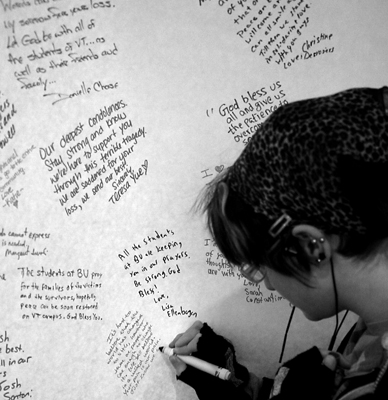
John Taylor watched his son, a Binghamton University freshman, play baseball last month during a road game.
“There was a big blue sky. It was sunny, warm. There was crispness in the air,” he said. “A perfect place.”
But for Taylor, a detective lieutenant for Vestal Police, it wasn’t just another road game.
“As I was standing there,” he said, “being a police officer, I thought ‘how could something so tragic happen on such a picturesque campus?’”
Taylor’s son was playing baseball in the serene Blue Ridge Mountains. He was playing baseball at Virginia Tech.
On that same campus on April 16, 2007, student Cho Seung-Hui opened fire in the deadliest shooting rampage in modern U.S. history. He massacred 32 people before taking his own life, changing the tide of his college and colleges nationwide.
“Life on every campus across the country has changed,” said David Hagerbaumer, director of Campus Life.
A year later, Binghamton remembers.
A memorial for the Virginia Tech tragedy will be held today to remember those lost and to talk about campus safety. The program, which is at 6:30 p.m. in the Mandela Room, will feature speakers from Student Affairs, the Counseling Center and University Police. The stage will be draped with a paper “memorial chain” with messages from BU students written on each link.
The horror that took the life of students and staff sent shock waves that rippled here at BU.
“My sense of students’ initial response was that they wanted to know how something like this could have occurred to cause such destruction and horror on a college campus,” said Lloyd Howe of Student Affairs.
Stories surfaced of friends who were supposed to be there, but fate must have kept them home.
Meredith McWilliams, a junior human development and psychology major, has a friend at Virginia Tech who was supposed to be in a building that day where the shooting took place. Luckily, he had skipped class, McWilliams said.
At first, he didn’t answer McWilliams’ phone calls.
“My initial reaction was being scared for my friend of course, and then relieved when I found out he was okay,” she said. “My friend really does not talk about it all that much. He said it was weird at his school after, but it also brought people together.”
Loni Rockman, a sophomore human development major, had planned a trip to the Virginia Tech campus that week. Her mother, who attended the school in the late ’70s, wanted to show her the college.
“I was watching [the news coverage] with my mom, and she was saying how everything looked the same and she felt like it was just yesterday that she was there,” Rockman said. “It kind of hit home a little more.”
And there were other stories.
Stories of friends who were there, and never returned home.
For Seshu Desu, dean of Watson School of Engineering and Applied Sciencehe, the killing was a reminder of how valuable life is. He lost two friends, both of whom were professors, in the shooting.
“This friend of mine wasn’t even supposed to go to class that day,” Desu said. “He leaves behind two kids and a wife. It’s very sad. It never goes away, but over time you get used to it.”
Five faculty were fatally shot.
“I still recall listening to a very vivid interview with a professor who barricaded himself inside his office and hid beneath his desk for fear he’d be killed,” said Mary Haupt, a journalism instructor. “It made me wonder how I’d react if I ever heard shots being fired near my own office. A sobering thought.”
The phone rang more than usual that day for BU spokeswoman Gail Glover, as she answered reporters’ questions about the University’s response to the tragedy.
“On a personal level, I was feeling a lot of sadness about hearing the news,” Glover said. “We fielded requests for most of the day about campus security. It was quite a busy day.”
Within the first 24 hours the University took steps to bring together people to discuss safety on the BU campus, Howe said. The University also searched out people to comfort those who needed it.
“Certainly our immediate reaction was one of horror for what had happened, but also one of how will it affect our University community,” Howe said.
In the wake of the tragedy, BU overhauled its campus safety strategy, implementing new technology and emergency-response methods.
“You dread the day it could possibly happen here,” said Investigator Dennis P. Bush of Binghamton’s New York State University Police.
The University can alert the students of an emergency through a hotline, text messages, an automatic Web page on Internet browsers, e-mail, a whistle atop the campus’s heating plant, the Library Tower’s bell chimes and digital message boards in the dining halls and on roadways.
Faculty and staff have spoken with the Counseling Center if they’ve had concerns for a troubled student.
Over the summer, campus officials split the Wellness and Safety Panel at freshman orientation into two separate panels.
The panels on safety — which included David Hubeny and members from University police, residential life, the Counseling Center and Harpur’s Ferry — tackled usual subjects, like computer theft, and current questions like, “What would happen at Binghamton if we had an active shooter on campus; how would we get information out to students if we had a situation like that on campus and what are we doing differently in terms of safety?” said Assistant Vice President for Student Life Kenneth Holmes, who moderated some of the six panels this summer.
Andrew Wine, a senior in high school, came from Saratoga Springs to visit the campus yesterday.
“Virginia Tech had an impact on me. It made me aware that [safety] could be an issue,” he said. “I feel like it’s safe here. I think that security wouldn’t be a problem.”
— Erika Neddenien and Ashley Tarr contributed reporting to this article.


